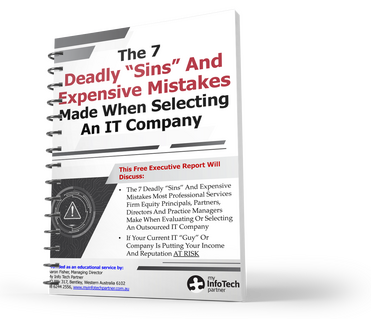I know you are really busy and don't have time for this right now. I know it seems like almost daily you're getting bombarded with things you must know or things you must do. I too have felt the same way. Being a business owner or business manager, your responsibilities are endless and sometimes you feel like putting your head in the sand or quitting.
 You’re either busy with your family duties, practicing your profession, finding more client work from existing clients, finding new clients or trying to find good employees to help you get the client work done.
You’re either busy with your family duties, practicing your profession, finding more client work from existing clients, finding new clients or trying to find good employees to help you get the client work done.
You probably roll your eyes every time you get an email from a Nigerian prince, asking you to transfer $25,000 to their bank account. Isn’t it also amazing (and highly coincidental) how you win the lottery from a foreign country on a weekly basis?
While the above scenarios may be obvious as a scam to some, it never hurts to refresh your mind on how or what to look for, so you don’t fall victim.
Recently, someone called us up, and advised they had lost $180,000 to scammers. The worst part about the situation was that the person’s wife wouldn’t talk to them because of the loss of the money. They were obviously not in a good way, and we did everything we could to help them out.
So how do you avoid being in the same situation where your partner is not talking to you because you’ve lost a large sum of money?
These are the top nine signs you (and your employees) should look for in any email, text message, instant message, phone call, that are warning signs or red flags.
- Be wary of attachments coming from known and unknown senders. Especially if there are any of the other warning signs also in the email or message.
- Be wary of supposed links to Word documents, Excel spreadsheets, PowerPoint presentations, PDF files from unknown or known senders using or pretending to use online file sharing services such as Dropbox, OneDrive, SharePoint Online, Adobe Cloud, Google Drive, Box and the list goes on.
- Apply context to emails, messages, voicemails, phone calls received at all times. For example. Ask yourself Am I expecting this person to contact me at this time? If you are not sure pick up the phone and call them to verify on a public number, not one in the email, message, voicemail or one they give you on the phone call.
- Unusual requests. Is someone you know, possibly your boss or manager asking you to send them gift cards or send them personal information such as tax file numbers and date of births? This is another common recent technique to scam money, especially the gift card strategy. Another could be requests for large sums of money or any money to be transferred, especially if it is supposed to be an investment. Do they keep asking for more money?
- Is their “business” a new entity or has it been in operation for some time? In the video accompanying this post I show how you can do some basic checks to verify this. It is quite common for scammers to setup fake company’s or businesses with websites to make themselves look legitimate.
- Does it sound too good to be true? Are they promising you will make massive amounts of money? If so, do they have publicly verifiable proof of that? Are they a reputable company?
- Is there grammatical or spelling errors? Is punctuation missing? Are certain words not quite how they should be? Does it seem like it was written by someone for whom English is a second language?
- Does the sender’s name and email address match? It is common in phishing emails for these to differ, especially if the organisations email system has been correctly configured to prevent “spoofing” of emails. Are they trying to impersonate key stakeholders or firm leaders from free email addresses or external email addresses?
- Is there an urgent action you need to take? Often there will be urgency to take action due to email deliverability issue or something like this. They are using our human psychology against us, to get us to act in haste.
Naturally, stop take a few deep breaths, count to 10, and ask someone else what they think of the request. If all else fails and you are still unsure of an email, text message, instant message, or phone call, reach out to us and we’d be happy to help with an independent assessment.
If you are a business owner, I’d encourage you get your team trained on how to spot and recognise these scams. I know you’re busy with other priorities and this is not something you enjoy.
Would it be inconsiderate to ask when does it become irresponsible to not invest in your team with the right training and the right services to protect your family’s livelihood?
Want help preventing reputation damage, protecting your family’s livelihood and ensuring you don’t fall victim to scams, phishing emails or cyber-attack? Click here www.myinfotechpartner.com.au/initialconsult/ or give us a call on 08 6244 2556 to schedule a quick initial consultation call today.
My Info Tech Partner is a trusted IT Services and IT Support provider in Perth that specialises in protecting reputations and family’s livelihoods with advanced cyber security services for legal, accounting and financial services firms and is the only one that offers a $10,000 “Never Pay the Ransom” Guarantee.





 Contact Us On
Contact Us On



